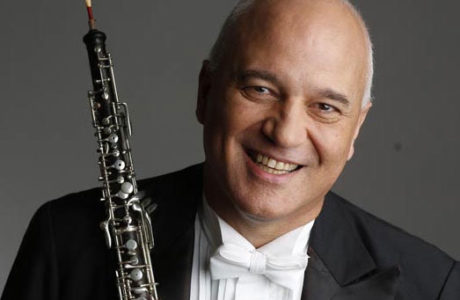Alex Klein joins Orion Ensemble for season opener

Last week the Chicago Symphony Orchestra opened its season with its principal oboe chair unoccupied. Again. After being welcomed back to the CSO amid great pomp and circumstance at the beginning of last season, oboist Alex Klein—one of the world’s finest double reed players—was denied tenure at the season’s end. That’s the bad news.
The good news is that Klein remains in Chicago on the faculty of the DePaul School of Music, and continues to perform locally. Sunday night at Nichols Hall he leant his considerable talents to the Orion Ensemble’s first program of the season, preciously entitled “A Beautiful Oboe and Friends.”
While Klein’s playing may have diminished a shade from his days in the CSO in the Barenboim era—no doubt largely due to his well-publicized battle with focal dystonia—it remains difficult to imagine finer wind playing, and his contributions were the evening’s highlight.
The program opened with Mozart’s Quartet in F Major for Oboe and Strings, K. 370, a chamber concertino for oboe in all but name. Klein’s playing in the opening Allegro had an unbridled élan, his trademark supple tone as inviting as the music itself.
The Quartet’s Adagio is perhaps the most concentrated movement Mozart ever wrote—a 37-bar aria of sublime pathos. Klein explained before the performance the players would omit four bars Mozart added at the request of the work’s dedicatee, oboist Friedrich Ramm, who wanted the opportunity for a cadenza. This made the movement even more laconic and, again, Klein’s delivery was exquisite. He went on to flick off the pyrotechnics of the closing Rondo with almost facile fluency. The string accompaniment—provided by Orion members violinist Florentina Ramniceanu and cellist Judy Stone, along with regular guest violist Stephen Boe—was generally supportive and unobtrusive, some hairy violin runs notwithstanding.
Prokofiev’s Quintet in G Minor, Op. 39 followed with Orion clarinetist Kathryne Pirtle and guest CSO bassist Robert Kassinger joining Klein, Ramniceanu, and Boe. The players amply conveyed the unhinged, skittish quality of the work’s faster movements. Particularly impressive was the clinic in circular breathing (simultaneously breathing in through the nose while forcing air out through the mouth by compressing one’s cheeks) Klein gave in the Adagio pesante, where the oboist is called to play a continuous droning ostinato at the bottom of his instrument for the entire movement.
The second half opened with a genuine curio: Mozart’s Sonata in B-flat Major for Bassoon and Cello, K. 292, in an arrangement by Klein substituting bass oboe for the bassoon part. Klein joked that, per note, the bass oboe is the most expensive instrument in the orchestra: “8,000 euros for five notes,” referring to the five-note bass oboe solo in the beginning of “Saturn” from Gustav Holst’s The Planets—indeed the only moment in the standard repertoire where the instrument is prominent.
Klein’s agile bass oboe playing in the duo sonata made one immediately forget the 1775 work was written over a century before the bass oboe was invented (in 1889). The outer movements were untroubled and magnanimous, Klein and Stone making simpatico partners. The bass oboe is an unwieldy instrument to play, but Klein’s expressive large intervals in the Andante never betrayed that fact.
The evening closed with Ramniceanu, Boe, Stone, and Kassinger joined by Orion pianist Diana Schmück for Schubert’s well-worn yet beloved “Trout” Quintet in A Major, Op. 114. The performance had its moments, the central Scherzo faring best with propulsive upbeats and the trio imbued with an inward landler quality. Overall the reading sounded perfunctory, and in music this familiar, mere adequacy only goes so far.
The program will be repeated 8 p.m. Monday on WFMT 98.7-FM. The Orion Ensemble’s next performances November 5, 8, and 12 will feature Bernstein’s Sonata for Clarinet and Piano, Dohnányi’s Serenade for Violin, Viola, and Cello, Erling Patrick Horn’s Black Tango, and the Schumann Piano Quartet. orionensemble.org
Posted in Performances





